"Dry spells hit eight regions, disrupting crop production" - Dr. Bryan Acheampong confirms
- Think News Online

- Aug 26, 2024
- 2 min read

Food and Agriculture Minister, Dr. Bryan Acheampong has confirmed that eight regions across the country are currently facing significant dry spells, which have severely impacted crop production.
He noted that these regions, experiencing a lack of rain over the past two months, are grappling with disrupted planting seasons, raising concerns over potential low yields and crop failures.
The Northern Region has been hit the hardest, while the Upper East Region, though affected, is experiencing relatively milder conditions.
He explained that notable communities in the Upper East Region have all reported insufficient moisture levels, leaving crops stranded just as the planting season was set to commence.
Dr. Acheampong emphasized that the livelihoods, investments, and incomes of over 980,000 farmers, cultivating an estimated 1.8 million hectares of land, are now at risk.
The ripple effects of this dry spell are expected to be felt throughout the agricultural value chain, from farmland to food supply, potentially impacting the entire country.
“We fully understand the immense pressure this situation brings on farmers, value chain assets, and our food system,” Dr. Acheampong stated.
“I want to assure the nation that the Ministry of Food and Agriculture is actively working to mitigate the adverse effects of this dry spell on our farming communities and food systems.”
He highlighted the Ministry’s ongoing efforts under the five-year master plan for food security and resilience, launched in August 2023.
The plan, known as "Planting for Food and Justice," aims for self-sufficiency in the production of 10 key crops and 4 tree species over the period.
Central to this initiative, he disclosed is the Ghana Agriculture and Agriculture Platform (GAP), an integrated digital solution that has already registered over 553,955 farmers, with ongoing efforts to reach 1.2 million by 2024.
Dr. Acheampong also noted the Ministry's success in achieving production targets for various crops in 2023, with maize being the only exception, falling short by 15% of its target.
Looking ahead to 2024, he outlined ambitious targets to increase self-sufficiency, particularly in poultry and rice production.
The Ministry remains vigilant in monitoring the situation, especially in the southern regions, where rainfall disruptions are also being observed.
Dr. Acheampong assured the nation that all necessary measures are being taken to support farmers, secure food supply, and prevent potential long-term economic impacts.
Story by: Joshua Kwabena Smith








Comments